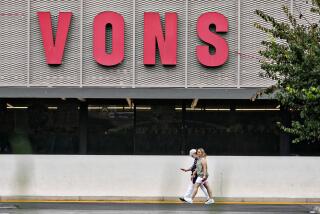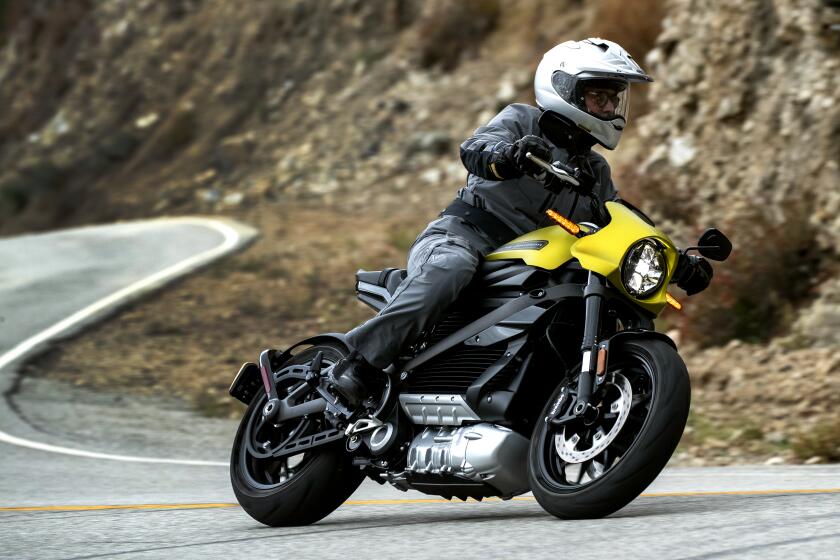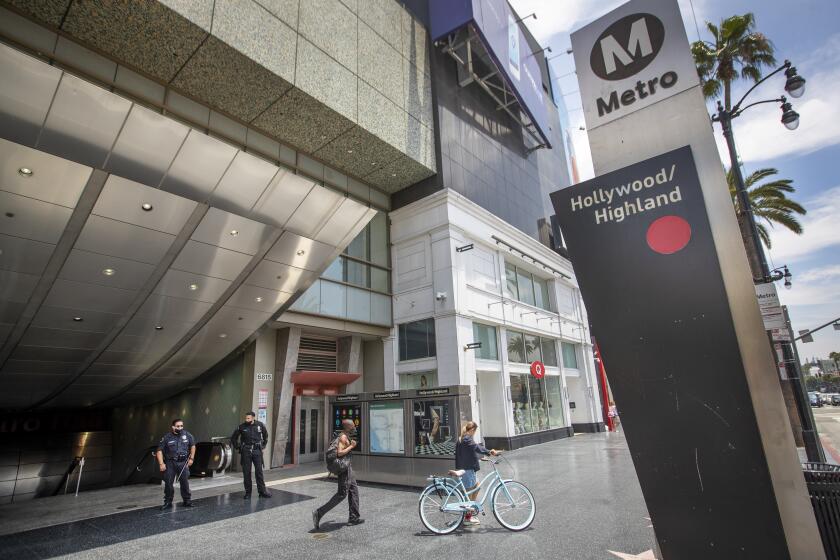Federal Express Buys Tiger International : Flying Tiger employees lauded the $880-million deal. One called it ‘cause for a Merry Christmas.’
Tiger International, the parent of air-cargo carrier Flying Tiger Line, agreed Friday to be bought by Federal Express for $880 million in a deal that would create a globe-circling, door-to-door freight-delivery business.
The merger may end the career of the colorful Flying Tigers, born of World War II aerial combat, though both companies said no decision has been reached on whether the Tiger name will be kept alive or just how Tiger will eventually be integrated into Federal Express’ system.
But the move is also likely to expand the merged company’s presence in Los Angeles, Tiger’s headquarters. It will also give Federal Express a big thrust into the burgeoning Pacific Rim market, where it has so far met with more grief than gratification.
Spokesmen for Flying Tiger’s 6,300 employees--a third of whom are based in Los Angeles--reacted positively to news of the deal, one calling it “cause for a Merry Christmas.”
“Federal Express is a class act,” said Frank Macguire, the 16-year Tiger veteran who heads the company’s unit of the Air Line Pilots Assn. “If you’ve got to be swallowed, this is a good company to be swallowed by.”
The two companies signed a definitive agreement early Friday after their directors met through the night in New York, breaking shortly before 1 a.m. to leave final drafting to the lawyers. What emerged was a cash tender offer--starting next Tuesday--of $20.875 for each Tiger International share.
Tiger’s largest shareholder, New York financier Saul P. Steinberg’s Reliance Group Holdings, agreed to sell its 16.5%of outstanding shares of common stock to Federal Express at the same price. If the required majority of shares is tendered, the deal would close in the first half of 1989, the companies said.
Flying Tiger will operate, at least initially, as a separate division of Federal Express, retaining for the time being its present management, headed by 34-year-old President James A. Cronin III. But Macguire said the greatest challenge facing the merged company will be to “figure out how to put two proud and very competent families together.”
Industry analysts agreed.
“The biggest problem is merging the corporate cultures,” said Morten S. Beyer, president of Avmark Services, an air-transport consulting firm in Arlington, Va. Beyer described Federal Express as “fast on its feet” and “entrepreneurial,” but said Flying Tiger is still suffering from its money-losing experience through most of the 1980s. It was only after its employees agreed to sharp pay cuts starting in 1987 that the company regained profitability.
“The name is still good,” Beyer said, “but the tiger is getting a bit moth-eaten and old.”
Positive Reaction
Beyer also said both Tiger and Federal Express may beef up operations at Los Angeles International, at least modestly. For example, he said, Tiger performs the maintenance on its own fleet of airliners while Federal has that work done under contract. But now, he speculated, Tiger employees might assume those tasks.
Tiger was the day’s second-most actively traded stock on the New York Stock Exchange, with about 4.2 million shares changing hands. After spurting to the $20 mark from Thursday’s close of $16.875, it settled back to $19.375--still up a healthy $2.50 and a new 12-month high. Federal Express shares fell to $46.75, off 50 cents, in Big Board trading.
Analysts, some of whom have been rather cool toward Federal Express in recent months in the face of strong competition and cost-cutting in its overnight courier market of parcels weighing less than 150 pounds, reacted positively to the news.
“It’s a good move for Federal Express,” said Daniel A. Hersh, a travel industry analyst with Bateman Eichler, Hill Richards in Los Angeles. “Their business holds a lot of risks, and this diversifies them. They’ve been hammered by concerns over how (facsimile machines)will affect the overnight package business, so getting into the bigger pieces of cargo is a good move.”
Federal Express pioneered coast-to-coast courier service and today carries more than a million pieces a day on its fleet of 104 cargo jets and 137 smaller planes that crisscross the nation, mostly through its major hub in its headquarters city of Memphis, Tenn.
Founded in the early 1970s by Frederick W. Smith, then 27, to fly checks and documents overnight between Federal Reserve Banks, the fledgling firm--which is still headed by Smith--got a big boost in 1977 when airline deregulation allowed it for the first time to move up to use of full-size jet aircraft from the diminutive DC-3s it had been flying.
A Lock on Heavy Cargo
In recent years, however, Federal Express has run into increased competition and falling prices in the domestic market. Not only has it been pressed by hard-charging, privately owned United Parcel Service and a handful of smaller companies, but it has also been hurt by the rapid spread of electronic facsimile transmission machines.
“Businesses of every size and type now routinely send messages electronically,” said Russ Schamun, senior vice president of Right-O-Way Inc., a freight forwarder based in Tustin. Immune to that phenomenon is the heavy cargo that Flying Tiger specializes in, he said, quipping:”You can’t fax a machine part.”
Schamun predicted that the international market will grow 13% next year while the domestic delivery business grows a more modest 8%.
Federal Express has tried to respond by expanding abroad. But the company has found entry into Japan and other Pacific Rim countries to be, so far, slow and costly, according to analysts, some of whom had downgraded their Federal Express investment recommendations to “hold” or “neutral” last July, in large part because of that problem and the slowing domestic market.
FEDERAL EXPRESS
Year Sales Profit (ended May 31) (billions) (millions) 1988 $3.89 $188 1987 3.18 167 1986 2.61 132 1985 2.03 76 1984 1.44 115
Assests: $3.01 billion. Airplanes: 241 Employees: 63,000 12-month stock price range (NYSE): $51-$35375 Friday’s close: $46.75, down $0.50 Source: Standard & Poor’s and company reports.
TIGER INTERNATIONAL
Year Sales Profit (ended May 31) (billions) (millions) 1987 $1.23 $58.7 1986 1.11 (45.1) 1985 1.15 (57.2) 1984 1.21 44.2 1983 1.25 (95.6)
Assests: $989.1 million. Airplanes: 39 Employees: 6,300 12-month stock price range (NYSE): $19,375-$9.50 Friday’s close: $19.375, up $2.50 Source: Standard & Poor’s and company reports.






